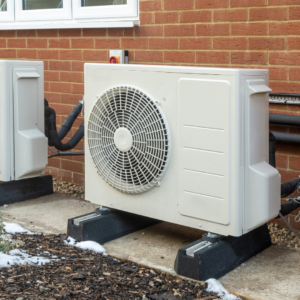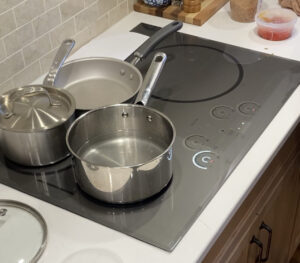Building electrification essential to meet Des Moines' climate goals
posted
by Matt Ohloff on Tuesday, April 26, 2022
The Des Moines City Council has committed to achieve net-zero greenhouse gas emissions by the year 2050, but this cannot happen without a concerted effort to reduce these emissions altogether. The Iowa DNR found that around 30% of Iowa’s emissions came from fossil fuel use in buildings. This is mirrored in the City of Des Moines’ most recent Greenhouse Gas Inventory Report, which found significant emissions coming from buildings and natural gas use. Reducing a city’s level of greenhouse gases is key to combating climate change and air pollution.
Building electrification is a necessary step to shift away from fossil fuels and can help communities meet their clean energy goals. Generally speaking, building electrification involves switching from heating and cooking appliances that run on methane gas to units that run on electricity. With Des Moines having committed to achieving carbon-free electricity by 2035, that means those appliances will be run on 100% clean energy down the road. Examples of this include using an electric heat pump to provide in-home heating or induction cooktops for cooking instead of gas ranges.
Electri c heat pumps have been on the market for some time, however, technological advancements have recently made them an attractive alternative to traditional heating systems. Air source heat pumps and ground source heat pumps, which draw heat from the air and ground respectively, both work similarly to a refrigerator running in reverse, gathering heat from the outdoors and transferring it to a home’s interior. Older models were better suited for fair-weather climates, but recent gains in efficiency have allowed them to become a viable heating option for cold weather climates too. The switch to electric building heating will not only lower emissions, but will also help customers avoid the high bills that come with volatile gas pricing.
c heat pumps have been on the market for some time, however, technological advancements have recently made them an attractive alternative to traditional heating systems. Air source heat pumps and ground source heat pumps, which draw heat from the air and ground respectively, both work similarly to a refrigerator running in reverse, gathering heat from the outdoors and transferring it to a home’s interior. Older models were better suited for fair-weather climates, but recent gains in efficiency have allowed them to become a viable heating option for cold weather climates too. The switch to electric building heating will not only lower emissions, but will also help customers avoid the high bills that come with volatile gas pricing.
One source of greenhouse gas emissions and indoor pollution often overlooked are kitchen appliances. A new study reveals that methane leaking from natural gas-burning stoves inside U.S homes has a climate impact that is comparable to the amount of carbon dioxide emissions from about 500,000 gasoline-powered cars. The study also found that methane emissions from the gas emitted while igniting and extinguishing a burner were on average equivalent to the amount of unburned methane emitted for about ten minutes of cooking with the burner. On top of this, methane was found to be leaking out into homes when the stovetops aren’t even in operation. These emissions accounted for around three-quarters of the total amount measured.
Gas stoves, especially when unvented, can be a primary source of indoor air pollution. Stovetops directly expose individuals to carbon monoxide and nitric oxides which can trigger a range of health problems. It is a bigger issue the smaller the space, for instance, apartments can fill up more quickly with pollutants than a large home. Induction stovetops, which provide precision heating through electromagnetic waves, are a great substitution for gas ranges. Not only do they provide improved indoor air quality, but they are also easier to clean and safer for households with children. Electrifying our buildings not only reduces emissions, but also helps improve indoor air quality and create healthier homes.
directly expose individuals to carbon monoxide and nitric oxides which can trigger a range of health problems. It is a bigger issue the smaller the space, for instance, apartments can fill up more quickly with pollutants than a large home. Induction stovetops, which provide precision heating through electromagnetic waves, are a great substitution for gas ranges. Not only do they provide improved indoor air quality, but they are also easier to clean and safer for households with children. Electrifying our buildings not only reduces emissions, but also helps improve indoor air quality and create healthier homes.
The year 2050 has been flagged by the Intergovernmental Panel on Climate Change as a pivotal year globally to reach net-zero to prevent the most severe impacts from climate change, and Des Moines has rightly aligned its goals to meet this benchmark. One of the actions Des Moines can take is to provide an incentive to electrify new buildings through its tax abatement policy. If we continue to install gas appliances in our new buildings, we’re essentially locking in fossil fuel dependence for decades to come. Having an all-electric incentive for new buildings is an important first step for the city to expand sustainable infrastructure, improve citizen health, and meet its clean energy commitments.
- clean energy
- climate change
- energy efficiency